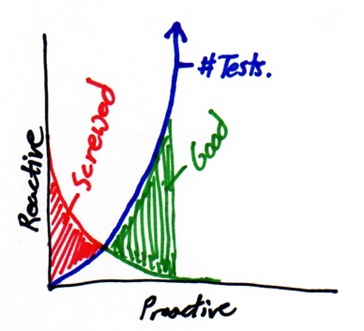Is your thought leadership strategy as solid as a rock? Let's get real—having a strategy…
Are You Being Reactive or Proactive?

You’ve developed great content and things seem to be moving along. You’re satisfied with the momentum you have and your work is being well received. Sounds pretty good. The question to now ask is, “Are you being reactive or are you being proactive?” Do you have a plan in place with goals and milestones you are attempting to reach or are you reacting to what comes across your plate and confusing activity with progress?
Most thought leaders do not have a plan in place for their business. They’re busy, life is hectic and at the surface it seems that things are moving in the right direction. They’ve got a lot of people helping them out but each person or group may have an objective that is not aligned with the overall objectives of the thought leader.
This is particularly the case when thought leaders fail to clearly articulated their goals clearly to those around them. A publicist’s job is to generate publicity; a publisher’s job is to sell books; speaking agents book speeches, web developers develop your web site, friends and colleagues may find opportunities that they believe are viable for you; and the list goes on.
Back to the question of being reactive or proactive: Think about the last two weeks – the conference calls, the meetings, introductions that were made. How did you spend your time? Did you spend it executing against a plan that was created specifically for you and your work? Did you spend it responding to others requests, approving things that seemed like they made sense and turning down other opportunities that didn’t? Did you say no to requests that, while on the surface, may not have been harmful, but just weren’t aligned to your specific goals?
Most authors tend to be reactive. They are focused on their work and trust those around them. When their “people” make requests of their time they tend to honor those requests. The people that you trust probably do have your best interests in mind and are doing what they believe is best for you. But how do you determine if you are getting closer to achieving your goals or if you are being distracted and side tracked? How do they know what opportunities to seek on your behalf?
You only know if you have a plan in place and if you are proactively aligning all of your resources so that you can execute that plan. It means communicating what it is you are trying to do, measuring your progress and when a request is being made of you having a logical and practical way to determine if it is worthy of your time and energy. The ability to filter out the noise is incredibly valuable and you simply can’t rely on intuition alone to guide you.
I’m not advocating not being flexible or resilient; in fact, the best of plans need to be constantly updated, tweaked and refined. You should leave yourself a window of time to do things that are not part of your plan but you need to take control. Activities that may seem fun, interesting, engaging or sexy but do not fit with your strategy are distractions and diversions. The more distracted you are the greater the risk that you will not achieve your objectives. People don’t become successful by being reactive, they become successful by being proactive.
You cannot simply flip a switch and go from being primarily reactive to proactive. You need to invest the time and energy it takes to develop a strategic plan that is right for you and your content. I’m obviously a bit biased as this is what I do for a living, but the reality is that being reactive is counterproductive and you simply can’t be effectively proactive unless you know what you’re trying to achieve, and you must be able to articulate that in a detailed manner to ensure that everyone around you is aware of exactly what you are attempting to achieve and how you plan on getting there.
Comments (1)
Comments are closed.

![Reblog this post [with Zemanta]](http://img.zemanta.com/reblog_e.png?x-id=15d1731f-05c1-4d8e-9c7e-cf5b95679b49)




Phenomenal article! This is certainly true in the tax and accounting vertical as well. Activity is thought to equal success. What many leaders fail to understand is how easily you can derail when there is no plan in place. How can you reach any goal if you don’t have a strategic vision identified to get you there?
I’ll be tweeting on this. I think it’s a MUST READ for many.